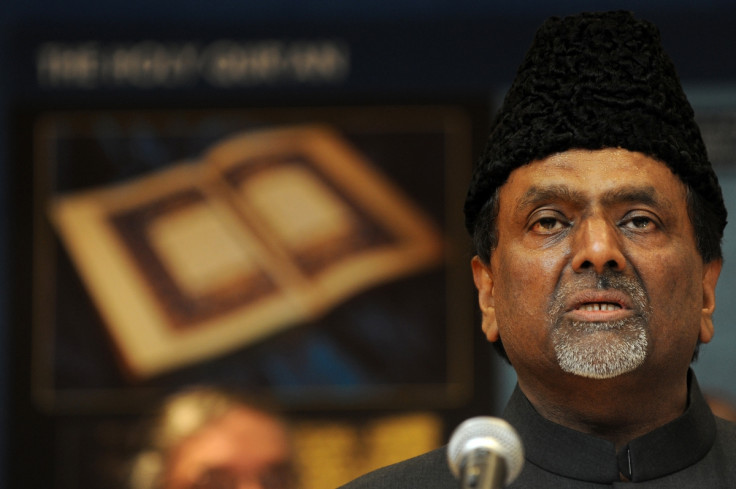Ahmadiyya leader urges Muslim Council to reject hardliners following 'kill Ahmadi' leaflets

The head of Britain's Ahmadiyya Muslim Community has urged the Muslim Council of Britain (MCB) to "take responsibility" and clamp down on hardliners, after leaflets calling for Ahmadi Muslims to be killed were distributed in London.
IBTimes UK last week exposed the distribution of anti-Ahmadi hate speech leaflets in several London locations, following the murder of Ahmadi shopkeeper Asad Shah in Glasgow in a religiously motivated attack.
Speaking to IBTimes UK in his office in the group's mosque in Southfields, south-west London, Rafiq Ahmad Hayat said that Muslim organisations such as the influential MCB, which represents 500 UK mosques, schools and other institutions, must clamp down on the message of intolerance preached by affiliated anti-Ahmadi group Khatme Nabuwwat (KN), which produced and distributed the leaflets.
"Even if we took away all the leaflets the message is still there, they are still preaching their hate," said Rafiq Ahmad Hayat. "If there is scrutiny and mosques are open you will find that is the first change required."
In the wake of Shah's murder, the MCB released a statement, in which it said "the targeting of Ahmadis for their beliefs is totally unacceptable".
However it refused to acknowledge the group as Muslims: "Muslims should not be forced to class Ahmadis as Muslims if they do not wish to do so, at the same time, we call on Muslims to be sensitive, and above all, respect all people irrespective of belief or background," said the MCB.
Hardliners associated with the KN group have branded the Ahmadi apostates, or those who reject their religion, and claim the Sharia law prescribes death as punishment. In Pakistan the group is forbidden from calling itself Muslim for its belief that its founder, Mirza Ghulam Ahmad, is the Mahdi or Muslim saviour.
The MCB claims to represent diverse parts of Britain's 2.8 million strong Muslim population. On its website it describes itself as "a broad-based, representative organisation of Muslims in Britain, accommodating and reflecting the variety of social and cultural backgrounds and outlook of the community."
Critics though allege it is dominated by orthodox Pakistani, Bangladeshi and Arab Muslims who freeze out smaller sects. The group's decision to boycott Holocaust Memorial Day between 2001 and 2007 drew widespread criticism, and in 2009 a council member declared support for Hamas, the Palestinian Islamist group classed as a terrorist organisation by the EU and the UK.
Basharat Nazir, a spokesman for the Ahmadiyya community in the UK, said: "The MCB has to decide what type of a membership they should have because that will define their ethos. It is not just a matter of excluding organisations, the more important thing is what are their objectives because their membership reflects their views on Islam and the type of society they wish to create here in Britain."
Hayat accused the MCB of failing to embrace a message of inclusiveness and tolerance: "Organisations like the MCB have to start taking responsibility because they claim to represent a large number of the mosques, which they do. But they have to start accepting that they do have to change their views. In Islam no one has the right to decide who is a Muslim and who is not a Muslim."
"Judge us on what we do. Judge us on whether we are good human beings or not. It does not matter what brand of religion you follow, as long as you are good human being. The bottom line is what sort of human beings are we producing through our teachings? And leave the rest to God."
The Metropolitan Police have launched an investigation into the leaflets under anti-religious hate crimes laws. However a previous attempt to prosecute KN for distributing anti-Ahmadiyya leaflets in 2010 collapsed when the CPS refused to press charges. KN's Forest Gate and Stockwell Green branches deny any connection to the recent leaflets, which can be downloaded from a KN affiliated website.
Hayat said that a change in law was necessary to ensure hate crime offences could be effectively prosecuted, with current anti-religious hate crime legislation requiring prosecutors to show that violence was the intended outcome of speech against a group in order to secure a conviction.
"The current legislation doesn't allow police to prosecute, or they are not successful if they prosecute. The problem that we have in this country is that we give parity to freedom of speech, which is one of the beauties of this country. But with freedom of speech must come responsibility and the conflict the government sometimes has, is to find that balance."
Critics argue that Sha's murder and the growth violent extremism in the UK demonstrated the urgent need for legal reform. "We are going to have to do something, because if we don't and matters continue things could get worse," he said.
The MCB had not responded to a request for comment from IBTimes UK at the time of publication.
© Copyright IBTimes 2025. All rights reserved.






















